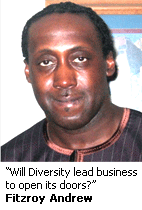 ReConnect Africa is a unique website and online magazine for the African professional in the Diaspora. Packed with
essential information about careers, business and jobs, ReConnect Africa keeps you connected to the best of Africa.
ReConnect Africa is a unique website and online magazine for the African professional in the Diaspora. Packed with
essential information about careers, business and jobs, ReConnect Africa keeps you connected to the best of Africa.


A recent study revealed that 17% of businesses polled cited the key driver for diversity in their organisation was that it makes business sense.
 ReConnect Africa asked leading Diversity expert, Fitzroy Andrew, what we really mean by diversity and as increasing numbers of Africans find employment in the West, how far are UK employers going in opening their organisations to diverse sources of talent?
ReConnect Africa asked leading Diversity expert, Fitzroy Andrew, what we really mean by diversity and as increasing numbers of Africans find employment in the West, how far are UK employers going in opening their organisations to diverse sources of talent?
The same study (see ‘The Business of Diversity’) also revealed that the need to conform to the law was perhaps more significant than the notion of business sense, with 32% of respondents citing this as the key driver for diversity. This gives a clue to what 'diversity' is often taken to mean in the UK's labour market in current times, referring to the range of policies and practices used by organisations across sectors to tackle discrimination in employment.
“Africans are employed in unprecedented numbers in the UK today”
It's worth keeping the bigger picture in mind as far as the overall employment status of Africans in the UK is concerned. There is a level of disadvantage – arguably integral to the structure of the labour market here - which has consigned successive generations to an overall experience of higher unemployment and persistent under-employment compared with a similarly-qualified white counterpart. So if diversity offers a route towards improving this situation – making sure the law works the way it should, and ensuring that more of us progress to roles which truly reflect our talents – all well and good, surely....
“The whole business of finding and developing talent rests on people making judgements about other people and their capabilities.”
And it's probably true to say that Africans are employed in unprecedented numbers in the UK today – partly because there are more of us here. More importantly, the range and nature of roles we are employed in has expanded greatly over the last thirty years. The numbers emerging at senior levels are small as yet, and largely confined to public services – no FTSE 100 company has a black person in an executive role on their board. It will be interesting to see whether this position persists over the next decade – though it is equally pertinent to ask why so few have emerged already.
“Legislation can only go so far”
So will 'diversity' lead business to open its doors to the widest range of talent in the community? To some degree, it will have little choice if it wishes to recruit at all over the next decade – people who are not white or 'British' will form one of the fastest-growing segments of the labour force over the next decade. As important, however, are questions about the level and speed of progression, and here it needs to be acknowledged that legislation can only go so far in creating a level playing field in employment. So far as the employment of black people is concerned, there is still much to do before 'equality' could be said to exist. We remain under-employed; in the worst cases, our very presence is still seen as threatening.
“People who are not white will form one of the fastest-growing segments of the labour force over the next decade.”
The whole business of finding and developing talent rests on people making judgements about other people and their capabilities. The emergence of black people in British boardrooms will be a critical test of whether diversity will have been seen to deliver in practice. It will show that British business believes that we have what it takes to succeed at the highest levels. I believe that we have missed out on a potential generation of business leaders in our community; I hope that we do not miss another.
Personally, I'll be happy when we reach a point where we no longer regard the presence of Africans in the boardroom as unusual. Maybe it'll happen sooner than we think, or maybe it won't. Time will tell.
Fitzroy Andrew is a Trustee of The Wainwright Trust, established in 1987 as an educational and research charity to commemorate and continue the work of David Wainwright, a pioneer in the field of workplace equal opportunities. Fitzroy writes here in a personal capacity.
